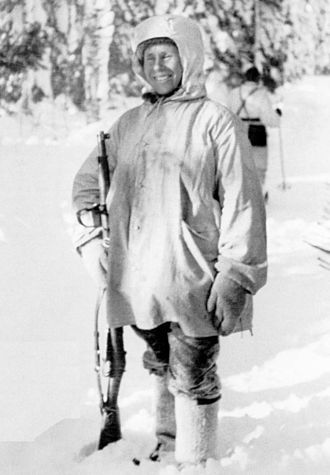The Russo-Finnish
Winter War of 1939 - 40
William R. Trotter
(Algonquin Books of Chapel Hill)

And so, knowing Russia would need passage for the upcoming European conflagration --- in 1939 Stalin asked, then demanded concessions in the Karelian Isthmus from Finland. When he didn't get them, he brought in a large, modern, well-equipped army to fight the ill-equipped army of Finland --- a country of nineteen million. What was astonishing was not that Russia won; what was astonishing was that it took them three-and-a-half months to do so.
Trotter is an admirable writer, and the tale of this war is filled with fascinating facts. The Finnish army may have been motley, but they were perfectly suited for the landscape --- many were farmers from the region, and they fought a guerrilla war not unlike that of Indochina 25 years later.
Despite an appalling lack of arms, they used what little matériel they had brilliantly. Their commanders were resourceful; their strategy was sound; their ability to hold their tide against a million Russian soldiers with all their airplanes, tanks, and firepower was a miracle.
The stories within a major story of a war are what makes for interesting history. Whether it is Tacitus, Clauswitz, Churchill, Fussell, Ward, or Trotter --- what holds the reader are the details. Here we have Baron Carl Gustav Mannerheim, who was one of the last of the dying breed of European nobleman commanders, one who was comfortable in at least five languages (except Finnish). At a meal with the German military,
a German officer produced a cigar and asked if it would bother the Marshal if he smoked it. Mannerheim fixed the Wehrmacht officer with a gaze . . . and cut him dead by replying evenly: "I don't know. No one has ever tried it."
 War in the wilds of Finland is not something to be taken lightly. The Russian army arrived in dark uniforms driving typical camouflage colored tanks that could easily be seen against the snow. The grease that worked for other wars in other lands --- for example, against the Japanese in Manchuria --- froze in the barrels of their guns in the sub-zero temperatures. (The secret that took them some time to figure out was to mix the grease with gasoline).
War in the wilds of Finland is not something to be taken lightly. The Russian army arrived in dark uniforms driving typical camouflage colored tanks that could easily be seen against the snow. The grease that worked for other wars in other lands --- for example, against the Japanese in Manchuria --- froze in the barrels of their guns in the sub-zero temperatures. (The secret that took them some time to figure out was to mix the grease with gasoline).
Something as simple as the design of a stove could be vital. The smoke of the Russian kitchens made an ideal target for Finnish riflemen, while the Finns themselves developed a smokeless stove. Sometimes the Russian soldiers were so hungry that they stopped military action at the moment that they overran a Finnish kitchen, creating a "sausage war." In counterattack, the Finns practically destroyed the now well-fed but lethargic battalion, and some Russians died still chewing on their wurst.
Russian tactics demanded straight ahead attacks, ignoring the fact that Finland had few roads --- there was no off-roading in the Arctic at that time --- and equipment and men could get jammed up, easy pickings for sharpshooters traveling by skis. Mannerheim had spent a dozen or so years as a commander in the Russian military --- so he knew the strengths and weaknesses of their tactical systems. His counterattacks involved lightning guerrilla raids from first one flank, then the other, keeping them constantly off balance.
With the exception of the Spanish Civil War, the Russo - Finnish Winter War was the most highly reported conflict in the western press during the period between WWI and WWII. The Finns were seen as brave and resourceful: heroes the world could relate to. They were also colorful. Kurt Wallenius, in command of the far north theater,
made great copy; he was profane, feisty, and swaggering. His "trademark" for visiting journalists was bare-chested virility, though more than one reporter privately wondered at the sanity of someone who would walk around with his shirt unbuttoned in temperatures of twenty below zero.
But war is war. Every now and again, what peeps out from under the specific battles and the commanders and the tactics and the names (those Finnish names!) is the fact that men are being butchered; indeed, in one early battle, Trotter reports that Finnish machine gunners had to be treated for shock after killing wave after wave of Russian soldiers who kept on coming, crawling forward on the bodies of those who were dead and dying.
The war lasted 105 days --- from November 26, 1939, to March 13, 1940. 250,000 Russians, it is believed, were killed --- versus 25,000 Finns. A national infrastructure of roads, power lines, dams, and rail links were destroyed --- and would take years to rebuild. At the beginning, the Russian army was an unknown; at the end of the conflict, the world knew that it was powerful; the world also knew how the Russians had mishandled what could have been a two-week conquest of a sparsely populated country. The lessons the general staff learned about fighting an implacable enemy were crucial to the ultimate success that it had two years later against the German Wermacht.
§ § § When I was ten years old, my grandmother asked me a riddle: "Why is a fire engine red?" The answer is still, 57 years later, stuck in my old memory-bag. It goes:
A fire engine's red.
A newspaper's read too.
Two and two are four.
Three times four is twelve.
Twelve is a ruler.
Queen Mary is a ruler.
Queen Mary is a ship.
The ship sails the sea.
The sea has fish.
The fish have fins.
The Finns fought the Russians.
A fire engine's always a-rushin'.
A Russian is red.
That's why a fire engine's red.If that little war could creep into the doggerel of my totally a-political granny, it's a sure sign of how the conflict between two far-off nations could become embedded in the consciousness of the then isolationist United States. That she could be teaching me such nonsense when she should have been making me memorize Shakespeare sonnets tells us something about her priorities, too.
--- L. W. Milam